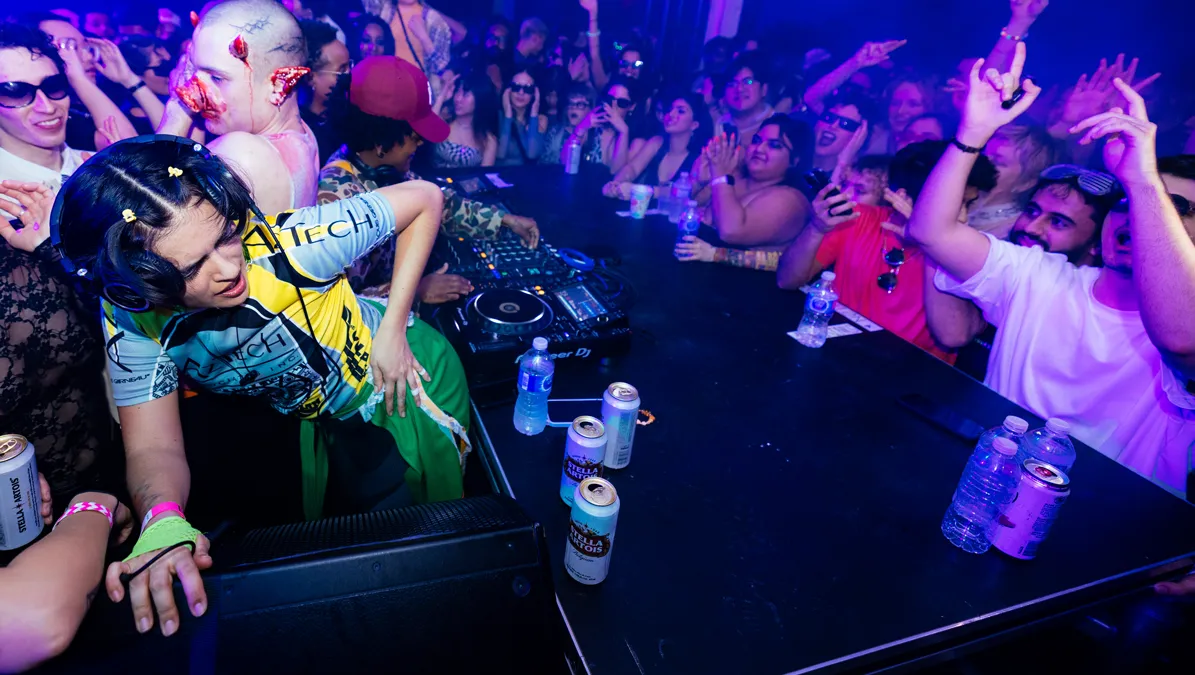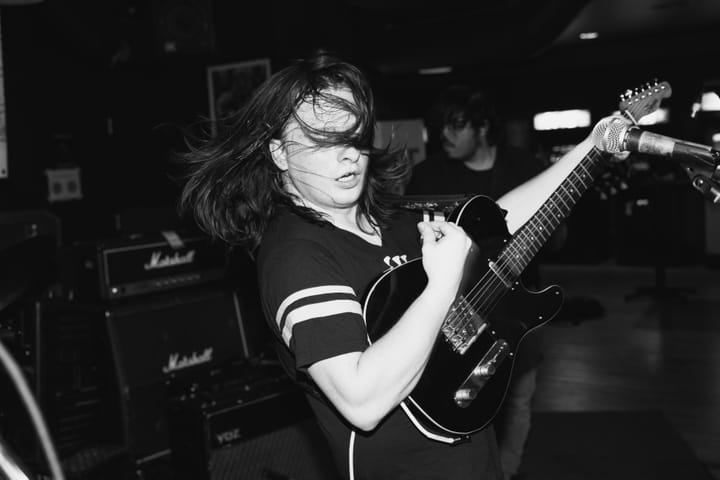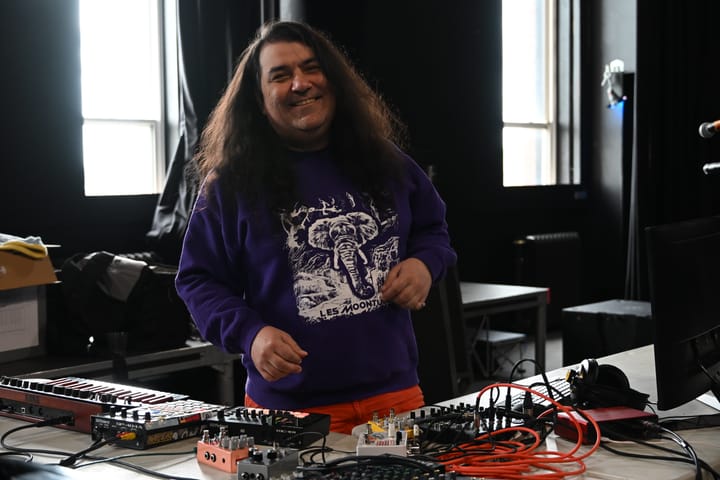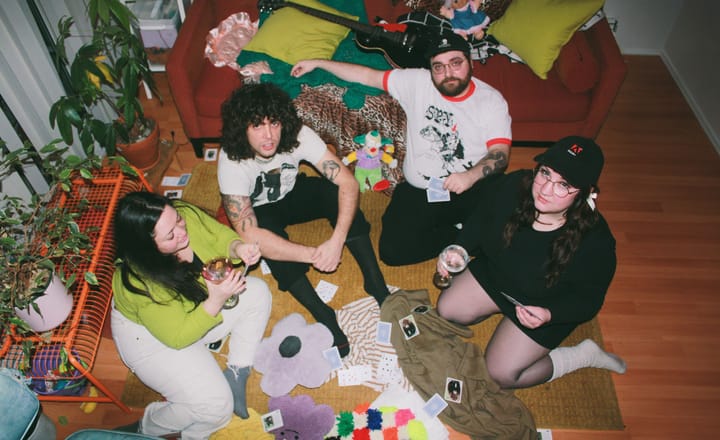
Q&A with ESCOBUTT: Art, Music, and Sex in the Digital Future
Colombian-Canadian artist ESCOBUTT has, within the span of a few years, become one of the most fascinating artists in Toronto’s underground music scene. Drawn to the futuristic ideas of the Mexico-based neo-cumbia collective Kumbia Net, their music is a playful yet pointed collision of genre and provocation. Their debut album, ID-ASS, breaks down conventional ideas of gender and sexuality while remixing the traditional genres of Latin American dance music for a new post-digital era. This conceptual and sonic hybridity also extends to other elements of their work as both a DJ, organizer, and sex worker, not unlike seminal industrial musician and performance artist Cosey Fanni Tutti.
I spoke with the artist over Zoom about the broader context of their work, the state of online sex work, perseverance in the face of structural obstacles, the importance of community, and their hacker-like attitude to living within the systems of the global north.
Daniel G. Wilson: Your foray into music creation has been relatively recent. Can you tell me what inspired you to write songs?
ESCOBUTT: During [lockdown], I started streaming as a DJ, and it became more and more obvious that with copyrighted material music that wasn’t yours, you can’t monetize. So I was like, okay, well maybe I have to figure out this music situation so I can create my own original content that I can then hopefully monetize down the line [laughs]. And so that’s when I started diving into audio as a whole.
You host a queer focused event series in Toronto called Lewdline. Can you tell me about it?
It was born out of a need to separate my labour as a booking agent and a DJ with the establishment and to have me be more of a promoter and event organizer because things were getting mixed up and there was some confusion regarding whether I was working and I was getting paid hourly or, versus like, am I gonna keep the door money kind of situation. And I think that was mostly the urgency for me to create a promoter account and a different entity, so that my boss stopped getting confused [laughs]. It was out of an effort to represent myself as a DJ and as an entertainer and because of that also trying to extend that to other women and BIPOC artists and talent in the city of Toronto.
That’s kind of my priority. Accessibility, visibility, and representation; hopefully soon representing people as well. That would be the ultimate amazing thing— to be the booker for international talent and to help showcase that here.
I’m still wondering if Toronto’s the best place to do that. Especially after having gone to Chicago and seeing how different things were. It’s just five hours away, but everybody was dancing cumbia, everybody— even the white people— were dancing cumbia better than I could ever dance.
Can you tell me what drew you toward making online adult content?
Going back to the reason why I was even interested in learning how to do audio altogether. I think it’s a great tool to incorporate, especially, when we talk about “spicy content,” and as a whole, I feel like with humans, 90% of what we consume is through our eyes; some people can’t. But then in that case, what’s the next sense that comes into the picture, right? So when you can support the visuals with the audio or with the sound it’s just incredible. That was part of the reason why I had always been interested in exploring sound. I guess apart from having an affinity for music and just being from Latin America, you know, like music is my whole life, dancing to it and feeling good about moving my body to music. Music making is not as difficult anymore to access or, even if you don’t have a proper studio, you can still figure out how to record your vocals or how to record someone else’s vocals or maybe fix them in the computer.
So similarly, I feel like with electronic music and what I’ve seen in the scenes that I’ve not even lived in but that I have looked at and observed from an outsider perspective, I guess sex sells. There’s a lot of girlies who know they have the assets [laughs], and what could be a better way of supporting those visuals than putting a song to them or making a song to match the visuals and using the system and the streaming platforms and social media as a way to just spread that image and their image as far as they can and reach as many eyes or ears as they can?
Do you think that the increasing use of the internet has empowered sex workers?
Before OnlyFans, the only type of “sex work” I did was more like borderline sugaring, like sugar daddying, and I never escorted, I never stripped, so my experience with sex work is I would say 90% online. Did it empower people? Yes. But there’s also a flip side to that because it really depends on where you are and the resources you have. Same thing with being able to create a whole package of music videos with press pics and all the mixing, mastering, it requires a lot of money, right? It’s a big investment. And so if you can buy yourself the latest iPhone and make content and post it and you have a laptop to do things or maybe do a little live stream here and there, okay, great.
When I was back in Colombia there was this phenomenon of basically content houses— I don’t even know what they’re called. Guys started opening up these houses where girlies would go, and if you don’t have the resources, they give you the cameras, they give you a room and they give you everything you need, but they manage your money. They manage the accounts, right? And so, there’s the pimps — “digital pimps,” they call them.
It’s the same as before, but just digital. It’s just everywhere, in art, in the music industry, even in the sex worker or adult industry. If you have the means to do it, and if you have the resources, then sure, yeah, it might empower you. But if you don’t come from a privileged place already and you’re trying to do that, you could also very easily be taken advantage of by whoever is facilitating those resources for you. And I think it has the potential to empower people, but I also think it, like anything in this world, can just get ruined by capitalism and dudes who want to profit and exploit people. The music industry’s the same. Probably the film industry’s the same. I don’t even know, but I’m imagining it already.
The girls and the gays and the transsexuals and the people, that’s where I put all my hopes.
A lot of your work has a theme of going against societal orthodoxies whether it be expectations of gender or labour. Can you tell me what inspired this attitude in your work?
I think it’s necessary. I also feel like you have to learn or figure out how to go about it. I remember like six or seven years ago, I was so mad at men. I was like, you know, anti-men, like “guys, I don’t wanna have anything to do with you.” But then came my own streaming era, and I was like, “I can’t be mad at men, men are literally paying my bills” [laughs]. So I was finding the sweet compromise spot where you learn how to navigate the system that tries to oppress you and the systemic barriers that you have as an individual because of your identity or how you identify or how society chooses to identify you. And how to work with those so that you can further your agenda so you can innovate or so you can create these spaces.
Even with Lewdline, I guess at the beginning, the ideation process was like, I want it to be a space where we can do all the things that we shouldn’t do. You know, some sexual connotations, like naughtiness, but I also have to make sure that whatever I put here is Instagram friendly.
I can’t get censored [laughs]; if I get censored or taken down, how am I gonna promote [my work]? I have to figure out how to be smart about the imagery or the words we use and how to promote. Same with my own personal spicy content and how that relates to my brand, or even cumbia and me trying and wanting to be associated somehow with this collective made up of all men. So sometimes I’m like, “oh, I’m not really sure this is a good idea,” but also at the same time, it’s all men. So why wouldn’t they like a moaning song, [laughs], you know, like if anything, that there’s definitely a market, like an audience waiting for something like this, and they might be interested in it, and they might wanna support it.
An element of being a Canada-based artist with roots outside of Canada is that we are often misunderstood by the people in both our “home” cultures. Can you tell me about your experience being an artist in Toronto?
It’s always been like a privileged, elite kind of class or place or however you want to phrase this. So that’s why I also wanted to make the point that it depends on where you are, ’cause I feel like my influence here is definitely different from the influence that I can have in Colombia, per se. You know, everybody thinks I’m just like some gringa or something [laughs], where I’m from. But again, strategically speaking, I’m like, “did I end up here for that reason?” Because I feel like a lot of the problems in the world come from [things] that happen [or] are happening up here and so I’m like, infiltrating the elite [laughs]. I called it a year ago when there was an issue when I went to Colombia and people were going off about me and Juanito [my partner] having this savior complex or whatever, but it’s just like, no, I’m just trying to redistribute — put the funds back where they came from.
You know what I’m saying? I know that we were robbed of all this richness by the colonizers, but I’m not trying to go and play Jesus. I’m literally trying to give it back to the people that it was stolen from, right? Or like the places where the richness was robbed from, I guess. And I feel like I can do that here. Can I do that way better here than if I was down there? Who knows? I don’t think I would be an artist if I was in Colombia, [laughs]. I probably would’ve been a graphic designer or something at most. But yeah, for that I am grateful that I can think about these things and I have the time and the resources to think about these things and help however I can.
It’s interesting how technology also plays a huge role because I couldn’t live stream where my dad lives. The internet connection isn’t even that great. There is no fiber optic. So you know, it’s all connected in terms of artistry and the internet — everything is because of where we are and because I’m here, and even if I wanted to live elsewhere, I still think there’s just no better place to do what I do than here, ’cause I’m just hyper connected and everything is easier to do, technologically speaking.
Are there any artists, artists, or collectives in Colombia right now that you think are doing work people should check out?
A couple of the girlies that I’m rooting for in Medellín, two trans girlies (Grilleo) who have their own collective and also do their parties. I think now they’re learning how to DJ, ’cause before they only hosted the events and they would only host talent and promote talent. And when they do events, it’s like a party, but also an art show, but also a performance piece halfway through it. And it’s just like ballroom and everything that I think is cool. I really like their style and how they’re deconstructing fashion.
Envisioning the future is a common theme in both electronic music and sci-fi. Thinking of ways that technology can impact the world. Would you agree with this?
It’s a broad question too, [laughs], but to summarize it, yes. To keep it more contained, I wanna say the word “influencer” or “influence” ’cause that’s also contemporary and tied with TikTok and new social media platforms. The power that we have to literally influence people and change beliefs and thoughts— that is where I feel like technology plays along.
I guess to tie it back to my first point, how do we use the system or how do we navigate the situation within this very, very much very capitalistic, very oppressive, very, you know, male versus female and “there’s no other gender,” all these oligarchs, all of the situations that are happening worldwide is like, how do we navigate this world that very much exists? We’re freaking out about how Donald Trump is president of America again. I guess that’s where we just have to use the tools in order to be able to, to hopefully reach as many eyes and ears as possible.
A world where we work in community and help each other and uplift each other and, you know, get men to do everything for us, [laughs] and reverse the roles, you know? How can that be possible?
Read more

Sentries: Multifaceted Noise Rock

Step Into Little Stone Crow's World

